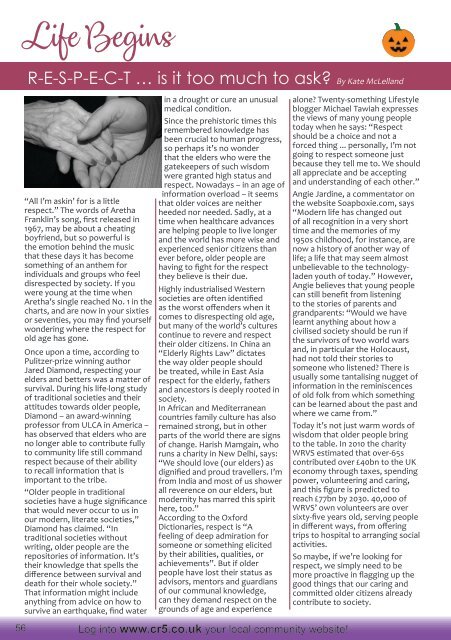CR5 Issue 161 Oct 2018
A local community magazine delivered free to 11,600 homes every month in the CR5 postcode. Contains local business advertising, interesting reads, Competitions, What's on in the Community and puzzles.
A local community magazine delivered free to 11,600 homes every month in the CR5 postcode. Contains local business advertising, interesting reads, Competitions, What's on in the Community and puzzles.
You also want an ePaper? Increase the reach of your titles
YUMPU automatically turns print PDFs into web optimized ePapers that Google loves.
Life Begins<br />
R-E-S-P-E-C-T … is it too much to ask? By Kate McLelland<br />
“All I’m askin’ for is a little<br />
respect.” The words of Aretha<br />
Franklin’s song, first released in<br />
1967, may be about a cheating<br />
boyfriend, but so powerful is<br />
the emotion behind the music<br />
that these days it has become<br />
something of an anthem for<br />
individuals and groups who feel<br />
disrespected by society. If you<br />
were young at the time when<br />
Aretha’s single reached No. 1 in the<br />
charts, and are now in your sixties<br />
or seventies, you may find yourself<br />
wondering where the respect for<br />
old age has gone.<br />
Once upon a time, according to<br />
Pulitzer-prize winning author<br />
Jared Diamond, respecting your<br />
elders and betters was a matter of<br />
survival. During his life-long study<br />
of traditional societies and their<br />
attitudes towards older people,<br />
Diamond – an award-winning<br />
professor from ULCA in America –<br />
has observed that elders who are<br />
no longer able to contribute fully<br />
to community life still command<br />
respect because of their ability<br />
to recall information that is<br />
important to the tribe.<br />
“Older people in traditional<br />
societies have a huge significance<br />
that would never occur to us in<br />
our modern, literate societies,”<br />
Diamond has claimed. “In<br />
traditional societies without<br />
writing, older people are the<br />
repositories of information. It’s<br />
their knowledge that spells the<br />
difference between survival and<br />
death for their whole society.”<br />
That information might include<br />
anything from advice on how to<br />
survive an earthquake, find water<br />
in a drought or cure an unusual<br />
medical condition.<br />
Since the prehistoric times this<br />
remembered knowledge has<br />
been crucial to human progress,<br />
so perhaps it’s no wonder<br />
that the elders who were the<br />
gatekeepers of such wisdom<br />
were granted high status and<br />
respect. Nowadays – in an age of<br />
information overload – it seems<br />
that older voices are neither<br />
heeded nor needed. Sadly, at a<br />
time when healthcare advances<br />
are helping people to live longer<br />
and the world has more wise and<br />
experienced senior citizens than<br />
ever before, older people are<br />
having to fight for the respect<br />
they believe is their due.<br />
Highly industrialised Western<br />
societies are often identified<br />
as the worst offenders when it<br />
comes to disrespecting old age,<br />
but many of the world’s cultures<br />
continue to revere and respect<br />
their older citizens. In China an<br />
“Elderly Rights Law” dictates<br />
the way older people should<br />
be treated, while in East Asia<br />
respect for the elderly, fathers<br />
and ancestors is deeply rooted in<br />
society.<br />
In African and Mediterranean<br />
countries family culture has also<br />
remained strong, but in other<br />
parts of the world there are signs<br />
of change. Harish Mamgain, who<br />
runs a charity in New Delhi, says:<br />
“We should love (our elders) as<br />
dignified and proud travellers. I’m<br />
from India and most of us shower<br />
all reverence on our elders, but<br />
modernity has marred this spirit<br />
here, too.”<br />
According to the Oxford<br />
Dictionaries, respect is “A<br />
feeling of deep admiration for<br />
someone or something elicited<br />
by their abilities, qualities, or<br />
achievements”. But if older<br />
people have lost their status as<br />
advisors, mentors and guardians<br />
of our communal knowledge,<br />
can they demand respect on the<br />
grounds of age and experience<br />
56 Log into www.cr5.co.uk your local community website!<br />
alone? Twenty-something Lifestyle<br />
blogger Michael Tawiah expresses<br />
the views of many young people<br />
today when he says: “Respect<br />
should be a choice and not a<br />
forced thing ... personally, I’m not<br />
going to respect someone just<br />
because they tell me to. We should<br />
all appreciate and be accepting<br />
and understanding of each other.”<br />
Angie Jardine, a commentator on<br />
the website Soapboxie.com, says<br />
“Modern life has changed out<br />
of all recognition in a very short<br />
time and the memories of my<br />
1950s childhood, for instance, are<br />
now a history of another way of<br />
life; a life that may seem almost<br />
unbelievable to the technologyladen<br />
youth of today.” However,<br />
Angie believes that young people<br />
can still benefit from listening<br />
to the stories of parents and<br />
grandparents: “Would we have<br />
learnt anything about how a<br />
civilised society should be run if<br />
the survivors of two world wars<br />
and, in particular the Holocaust,<br />
had not told their stories to<br />
someone who listened? There is<br />
usually some tantalising nugget of<br />
information in the reminiscences<br />
of old folk from which something<br />
can be learned about the past and<br />
where we came from.”<br />
Today it’s not just warm words of<br />
wisdom that older people bring<br />
to the table. In 2010 the charity<br />
WRVS estimated that over-65s<br />
contributed over £40bn to the UK<br />
economy through taxes, spending<br />
power, volunteering and caring,<br />
and this figure is predicted to<br />
reach £77bn by 2030. 40,000 of<br />
WRVS’ own volunteers are over<br />
sixty-five years old, serving people<br />
in different ways, from offering<br />
trips to hospital to arranging social<br />
activities.<br />
So maybe, if we’re looking for<br />
respect, we simply need to be<br />
more proactive in flagging up the<br />
good things that our caring and<br />
committed older citizens already<br />
contribute to society.

















